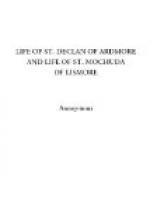32. On another (subsequent) occasion Declan visited Bregia, i.e. the original territory which belonged to his race previous to the expulsion of his ancestors. There he was treated with particular honour by the king of Tara and by the chieftains of Meath by whom he was beloved, since it was from themselves (their tribe and territory) that his forbears had gone out, for that region was the patrimony of his race and within it lies Tara. Declan instituted therein a monastery of Canons, on land which he received from the king, and it is from him the place is named. Moreover he left therein a relic or illuminated book and a famous gospel which he was accustomed to carry always with him. The gospel is still preserved with much honour in the place and miracles are wrought through it. After this again he turned towards Munster.
33. Declan was once travelling through Ossory when he wished to remain for the night in a certain village. But the villagers not only did not receive him but actually drove him forth by force of arms. The saint however prayed to God that it might happen to them what the Sacred Scripture says, “Vengeance is mine I will repay” [Deuteronomy 32:35]. The dwellers in the village, who numbered sixty, died that same night with the exception of two men and ten women to whom the conduct of the others towards the saint had been displeasing. On the morrow these men and women came humbly to the place where Declan was and they told him—what he himself foreknew—how miserably the others had died. They themselves did penance and they bestowed on Declan a suitable site whereon he built a monastery and he got another piece of land and had the dead buried where he built the monastery. The name of that monastery is Cill-Colm-Dearg. This Colm-Dearg was a kind, holy man and a disciple of Declan. He was of East Leinster, i.e. of the Dal Meiscorb, and it is from him that the monastery is named. When he (Declan) had completed that place he came to his own territory again, i.e. to the Decies.
34. On a certain day Declan came to a place called Ait-Breasail and the dwellers therein would not allow him to enter their village; moreover they hid all their boats so that he could not go into his own island, for they hated him very much. In consideration however of the sanctity of his servant, who prayed in patience, God the All-Powerful turned the sea into dry land as you have already heard. Declan passed the night in an empty stable out in the plain and the people of the village did not give him even a fire. Whereupon, appropriately the anger of God fell on them, who had not compassion enough to supply the disciple of God with a fire. There came fire from heaven on them to consume them all [together with their] homestead and village, so that the place has been ever since a wilderness accursed, as the prophet writes: “civitates eorum destruxisti” [Psalm 9:7] (the dwellings of the unmerciful are laid waste).




